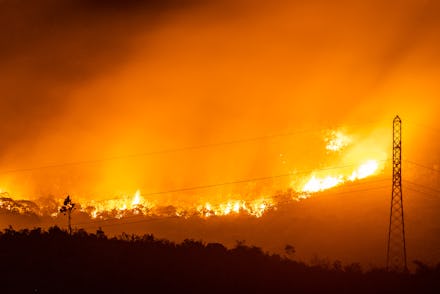Climate change isn’t just getting worse — it’s accelerating, says new report

We're reacting too slowly to keep up with the changes on our planet. Government officials and regulators have spent months, or years, debating about climate change. Presidents and prime ministers have denied its existence, leaving little done to mitigate or protect vulnerable citizens from the effects of climate change.
Communities have been left alone to battle longer wildfire seasons, hard-hitting storms, the loss of arctic sea ice, and rising ocean levels.
Some researchers didn't know the situation would get this bad so soon. However, writes The New York Times, improvements in technology and measuring instruments in the past decade have given scientists a better idea of what's happening. And it's not good.
"Things are getting worse," said Petteri Taalas, Secretary General of the World Meteorological Organization (WMO), to The New York Times. Yesterday, the WMO, an intergovernmental organization that tracks climate throughout the world, released a report that noted the sharp increase in temperatures that happened this decade. The end of 2019 is making its mark as it closes out the warmest decade on record.
"If we do not take urgent climate action now, then we are heading for a temperature increase of more than 3°C by the end of the century," he stated in the report, "with ever more harmful impacts on human well-being."
According to the report, those impacts are already evident. Extreme weather has hit a number of locations around the world, from searing heatwaves to once-rare flooding events. In Japan, for example, "a major heat wave event affected the country in late July to early August 2019 resulting in over 100 deaths and an additional 18,000 hospitalizations."
What happened in Japan is just one of many instances. "On a day-to-day basis, the impacts of climate change play out through extreme and 'abnormal' weather," Taalas said. "And, once again in 2019, weather and climate related risks hit hard. Heatwaves and floods which used to be 'once in a century' events are becoming more regular occurrences. Countries ranging from the Bahamas to Japan to Mozambique suffered the effect of devastating tropical cyclones. Wildfires swept through the Arctic and Australia."
These events aren't something that will only effect endangered animals. These changes can put a dent in every aspect of human life — from how we build our homes to whether certain foods will become scarce.
“One of the main impacts of climate change is more erratic rainfall patterns," explained Taalas in the report. "This poses a threat to crop yields and, combined with population increase, will mean considerable food security challenges for vulnerable countries in the future."
Some experts say we have, in some areas, already crossed the tipping point for how much we can prevent. The U.N. Secretary-General, António Guterres, has warned representatives at COP25 that the Earth is reaching a collective 'point of no return' towards a climate emergency. But there is still something that can be done.
"The only solution," Taalas suggested, "is to get rid of fossil fuels in power production, industry, and transportation."
It's an enormous feat to accomplish, but one that carries a lot of hope for the future. That the rapidly rising temperatures can be slowed — or stopped, as climate activists hope — by reducing the overall carbon emissions released into the atmosphere. "It’s more urgent than ever to proceed with mitigation," said Taalas. The longer it takes to address climate change, the more unprepared people will be when another weather event hits them.